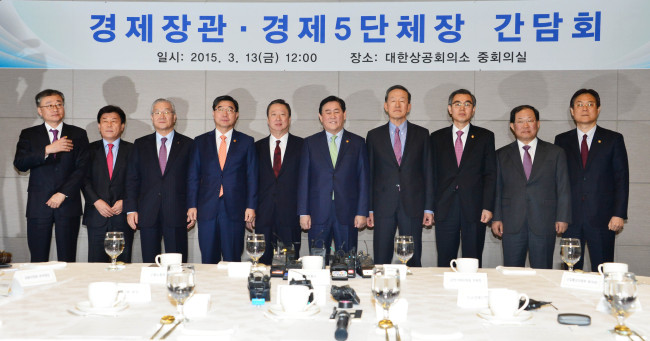South Korea’s Deputy Prime Minister and Finance Minister Choi Kyung-hwan called on the country’s major business group leaders Friday to raise wages and increase investment to boost consumption and help revitalize the economy.
“Conglomerates need to pay the optimum level of cash to their subcontractors in a bid to improve cash flows of small and medium enterprises,” Choi said during a lunch meeting with business group leaders in Seoul.
Companies are facing increasing pressure from the government, which has urged the private sector to increase wages in a bid to revive consumption and investment.
Recently, Samsung Electronics, Korea’s largest company, decided to freeze salaries for its employees, as it suffered lackluster earnings last year.
 |
| Finance Minister Choi Kyung-hwan (fifth from right) poses for a photo with the heads of Korean business associations and officials of government agencies ahead of a meeting to discuss ways to revive the economy in Seoul on Friday. (Finance Ministry) |
“Although economic indicators show a slow upward movement, the recovery momentum remains weak due to uncertainties and structural problems,” Choi said.
To overcome the weak economy, the government will focus on pursuing reforms in the labor, finance, education and public enterprise sector, he said.
The business group leaders pledged to strengthen competitiveness and increase investment but asked government to carry out regulatory reforms.
“The business environment at home and abroad is expected to be harsh this year but it can be improved if (the government) pushes ahead with improvement of (Korea’s) economic structure and deregulation without delay,” Huh Chang-soo, the Federation of Korean Industries chairman said.
Choi asked the business leaders to make full use of government’s 30 trillion-won program that to promote corporate investment, adding that the government would support long-term, risky investments.
The finance minister urged business leaders to put efforts into attracting foreign investment by using the free trade agreement between Korea and China as an opportunity.
Choi also urged the business group leaders to focus on youth employment, calling it a “matter of our society’s future.”
Youth unemployment in South Korea was 8.0 percent in 2013, more than double the overall unemployment rate of 3.1 percent.
“Effective agreement on structural improvement is needed to activate the labor market and create new jobs,” Park Byung-won, chairman of the Korea Employer’s Federation said.
The finance minister added that the government will focus on the macro-economic policies and drastic deregulation to revitalize the economy.
As a part of such efforts, the Bank of Korea cut its key interest rate to a record low of 1.75 percent Thursday to prevent deflation.
“To a certain extent, a rate cut will help the economy recover,” he said at the time.
By Park Han-na (hnpark@heraldcorp.com)



